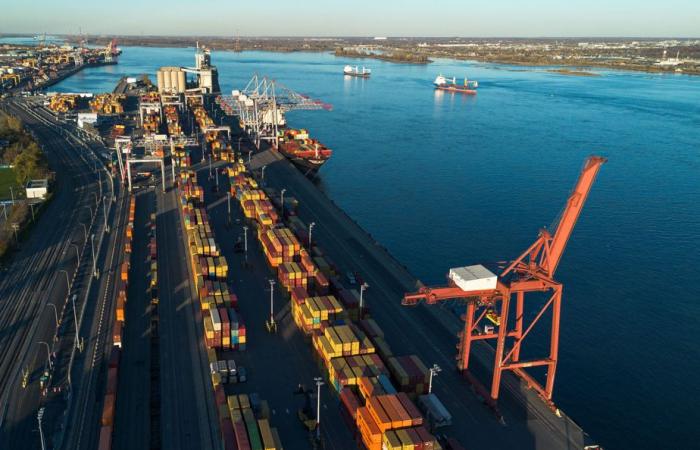The conflict between the 1,200 longshoremen at the port of Montreal and their employer continues to make waves. The employer initiated a lockout on Sunday evening at 9 p.m.
Posted at 8:51 a.m.
Updated at 9:09 p.m.
The longshore workers voted 99.7% against the employer’s offer considered “global and final”. The Association of Maritime Employers (AEM) “deplores” this result and has “no other choice than to decree the lockout”, it explains in a press release.
“The hostile offer was rejected because the employer refused to negotiate. Nothing in the offer reflects the union’s demands. If the Association of Maritime Employers (AEM) had respected the collective bargaining processes, we would have found solutions and avoided a conflict at the Port of Montreal,” comments union advisor Michel Murray.
The gap between the demands of longshoremen and the employers’ offer remains enormous. The employer is proposing a salary increase of 3% per year over four years, then 3.5% for the following two years. If this offer were accepted, the average salary of longshoremen would now be $200,000 per year, explains the AEM.
The union, for its part, is demanding a 20% increase over four years, and more flexibility in terms of working hours.
Intervention requested
To “resolve the impasse as quickly as possible”, the AEM asks the federal Minister of Labor, Steven MacKinnon, to intervene. Quebec manufacturers and exporters also believe that Ottawa must act, even if it means imposing a return to work.
The federal government was quick to launch the rail strike. We expect an equally prompt response, equivalent for maritime transport. We let the federal government make its decisions, but we ask it to exercise its leadership.
Julie White, spokesperson for Quebec Manufacturers and Exporters
To avoid future conflicts, Quebec Manufacturers and Exporters suggests that maritime transport now be considered an “essential service”, which could limit work stoppages in the industry.
Each day of strike creates an economic deficit of approximately $90 million, according to a study by the Port of Montreal, caused by a freeze in exports and the supply chain to manufacturers.
Montreal’s international reputation is damaged by repeated labor conflicts at the port, fears Mme White. “Manufacturers need predictability to prepare, to remain competitive. These repeated conflicts undermine this predictability. We cannot continue like this,” she denounces.
A stagnating conflict
The conflict between the two parties has continued for months and has already given rise to strike days. Two terminals at the Port of Montreal are even closed due to a general strike by certain longshoremen.
The involvement of the federal government in the negotiations will therefore have had no obvious effect. On Friday, the longshoremen’s union and the AEM spent two hours at the Federal Mediation and Conciliation Service, without making any progress.
Canadian supply chains have been hit by three major conflicts this year, the other two involving rail and air transportation. A lockout also broke out a week ago at the port of Vancouver.
It is rare to see two ports located on two different coasts burst at the same time, believes professor in the department of business administration at Texas A&M University Jean-Paul Rodrigue. “The main reason is that contracts are negotiated separately [différents syndicats] and have different due dates. »
The recent strike by longshoremen from the International Longshoremen’s Association and those from the Gulf of Mexico is an example of this “asynchronism”, according to him.
“Synchronism would be a very damaging strategy since it completely closes supply chains and forces public interventions, such as special laws, almost immediately,” he analyzes.






